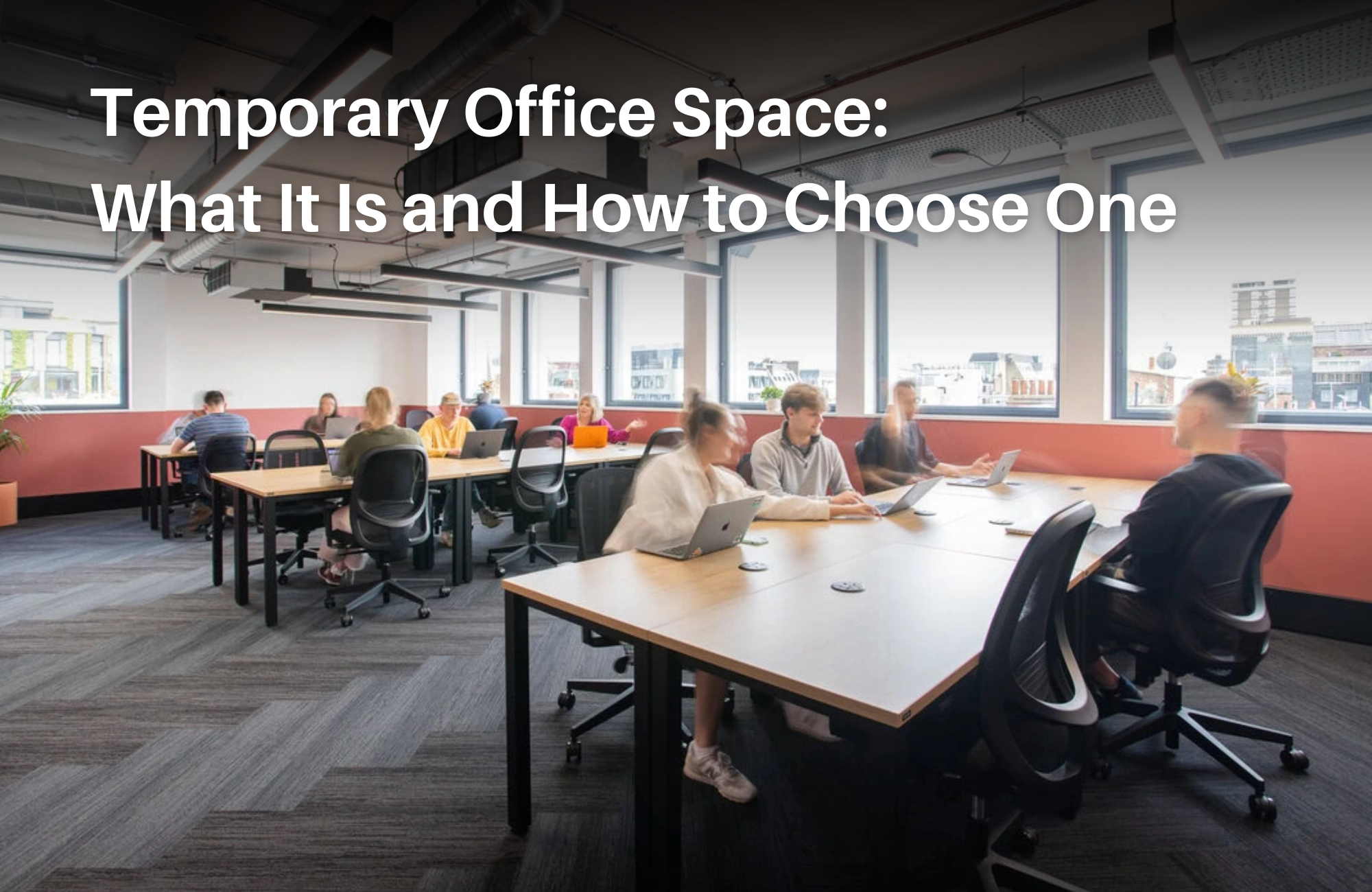
Temporary Office Space: What It Is and How to Choose the Right One
In today’s dynamic work environment, businesses and professionals increasingly seek flexible office solutions that adapt to their evolving needs. Temporary office space has emerged as a practical alternative to traditional office leases, offering a cost-effective, scalable, and convenient solution for companies of all sizes.
In this story
Whether you’re a freelancer in need of a dedicated workspace, a startup testing a new market, or a corporation setting up a temporary project office, flexible office rentals provide the infrastructure and professional setting required for productivity. The global shift toward hybrid work models and the rise of remote teams have further accelerated the demand for coworking spaces, serviced offices, and short-term rentals.
This guide explores the benefits of temporary office spaces, the different types available, key selection factors, and the latest industry trends. By the end, you’ll have a clear understanding of how to choose the right office solution that aligns with your business goals.
Why Companies and Individuals Choose Temporary Office Space
The need for temporary office space extends beyond startups and freelancers. Large corporations, project-based teams, and remote workers also leverage these spaces to enhance flexibility, reduce overhead costs, and create a professional work environment. Here are some of the key reasons why businesses and professionals opt for short-term office solutions:
Business Flexibility
Traditional office leases often require long-term commitments, sometimes spanning several years. For businesses that need agility, short-term office solutions offer:
- The ability to scale operations up or down quickly.
- Temporary workspace for expanding into new markets.
- The option to relocate without financial or logistical constraints.
This flexibility is particularly useful for growing startups, international companies testing local markets, and businesses with fluctuating workforce sizes.
Cost-Effectiveness
Renting a traditional office comes with significant expenses, including long-term lease obligations, maintenance fees, and infrastructure setup. Temporary office spaces eliminate many of these costs, offering:
- Pay-as-you-go pricing models (daily, weekly, or monthly).
- No need for upfront capital investment in furniture, utilities, or office equipment.
- Reduced administrative burden, as facilities are managed by the provider.
This makes coworking spaces and serviced offices attractive to small businesses and independent professionals seeking high-quality work environments at lower costs.
Short-Term Projects & Remote Teams
Many industries rely on temporary office solutions to accommodate short-term projects or distributed teams. Some common scenarios include:
- Consulting firms and agencies setting up project-based teams.
- Tech companies working on software development sprints.
- Event organizers needing temporary headquarters for planning and execution.
With access to fully equipped workspaces, businesses can focus on productivity without the logistical challenges of setting up a traditional office.
Professional Work Environment
While working from home offers convenience, it comes with distractions that may hinder productivity. A temporary office space provides:
- A structured environment conducive to focused work.
- Dedicated meeting rooms for client presentations and team discussions.
- A prestigious business address that enhances credibility.
This is particularly valuable for freelancers, consultants, and remote workers who require a professional setting without committing to a full-time office.
Networking and Collaboration Opportunities
Unlike traditional office leases, many temporary office spaces foster a sense of community and collaboration. Benefits include:
- Exposure to diverse professionals across industries.
- Opportunities for partnerships, mentorship, and business growth.
- Access to networking events, workshops, and business support services.
For example, Monteco Coworking in Montenegro provides a vibrant professional ecosystem where entrepreneurs and remote workers can connect, share ideas, and collaborate on new ventures.
Types of Temporary Office Spaces
Not all temporary office spaces are the same. Depending on the needs of a business or individual, different types of flexible office solutions are available, ranging from shared coworking environments to fully serviced private offices. Below are the most common types:
Coworking Spaces
Coworking spaces are shared office environments where individuals and businesses rent desks or private offices on a flexible basis. These spaces are ideal for:
- Freelancers and remote workers looking for a structured workspace.
- Startups seeking an affordable office with networking opportunities.
- Businesses that want to provide their employees with a professional remote-work alternative.
Key Features:
- Open workspaces and dedicated desks.
- Meeting rooms, conference facilities, and common areas.
- Fast internet, printing services, and office supplies.
- Community networking events and workshops.
Example: Monteco Coworking in Montenegro provides a dynamic coworking environment with a strong entrepreneurial community, professional amenities, and flexible membership options.
Serviced Offices
A serviced office is a fully furnished and equipped workspace managed by an office provider. Companies can move in and start working immediately, without worrying about office setup or maintenance.
Best For:
- Small businesses and startups requiring private office space.
- Companies expanding to new locations that need a temporary base.
- Corporations looking for a professional, fully managed office.
Key Features:
- Private, lockable office spaces with furniture.
- Administrative and IT support.
- Access to meeting rooms and business lounges.
- Reception and mail-handling services.
Business Centers
Business centers offer corporate-style office spaces with short-term leasing options. They cater to professionals and businesses that need a prestigious address without committing to a long-term rental.
Best For:
- Legal firms, consultants, and financial professionals.
- Companies needing short-term office space for client meetings.
- Businesses requiring a prestigious business address.
Key Features:
- Prime locations in business districts.
- Private offices and shared meeting spaces.
- Administrative and receptionist services.
Virtual Offices
A virtual office provides businesses with an official address, phone answering services, and mail handling without the need for a physical workspace.
Best For:
- Remote businesses that need a business address for credibility.
- Startups testing new markets without setting up a physical office.
- International businesses needing a local presence.
Key Features:
- Business address and mail forwarding services.
- Call answering and virtual receptionist options.
- Access to meeting rooms when required.
Pop-Up Offices & Project-Based Workspaces
Some businesses require office space only for short-term projects, such as seasonal campaigns, product launches, or temporary staff training. Pop-up offices provide flexible and temporary work environments tailored to specific needs.
Best For:
- Event management companies.
- Creative agencies working on time-limited projects.
- Corporations launching new products or services.
Key Factors to Consider When Choosing a Temporary Office Space

Choosing the right temporary office space depends on several factors that impact business operations, employee productivity, and overall costs. Below are the key considerations:
Location
The location of an office space plays a critical role in business success. When evaluating office locations, consider:
- Accessibility – Is it easy for employees and clients to reach?
- Proximity to public transportation – Is it near metro stations, bus stops, or major roads?
- Surrounding amenities – Are there restaurants, cafes, and business services nearby?
For example, coworking spaces like Monteco Coworking are strategically located in business-friendly areas, providing easy access for professionals.
Cost & Pricing Structure
Different temporary office spaces have different pricing models. Before committing, businesses should assess:
- Rental terms – Are the fees daily, weekly, or monthly?
- Hidden costs – Are utilities, maintenance, and internet included?
- Scalability – Can additional office space be rented as needed?
Facilities & Amenities
The right workspace should offer essential facilities that support daily operations. When choosing an office, consider:
- Internet speed and reliability – Critical for remote work and video calls.
- Meeting rooms and event spaces – Necessary for client meetings and team collaboration.
- Break areas and kitchen facilities – Improve employee well-being.
Work Environment & Atmosphere
The office environment significantly impacts productivity. Businesses should assess:
- Noise levels – Is the workspace quiet enough for focused work?
- Office layout – Does it provide a comfortable and ergonomic setup?
- Networking potential – Does it offer opportunities to connect with other professionals?
Lease Terms & Flexibility
One of the main benefits of temporary office spaces is their flexible leasing options. Key aspects to evaluate:
- Cancellation policy – Can the agreement be terminated without penalties?
- Short-term contracts – Are there no long-term commitments?
- Office upgrades – Is it possible to switch to a larger space as the business grows?
Security & Privacy
For businesses handling sensitive data, security is crucial. Important security considerations include:
- 24/7 access control – Are entry points monitored?
- Data security – Is there secure internet and IT infrastructure?
- Confidential meeting spaces – Are there private rooms for sensitive discussions?
Pros and Cons of Temporary Office Spaces vs. Traditional Offices
Temporary office spaces offer many advantages over traditional office leases, but they also come with certain limitations. While flexible office solutions provide cost savings, convenience, and scalability, they may not always be the best fit for every business. Below is a detailed comparison of the two options.
Cost and Financial Commitment
One of the biggest advantages of temporary office spaces is affordability. Businesses don’t have to commit to long-term leases, pay for office furniture, or invest in infrastructure. In contrast, traditional office spaces require significant upfront costs, including deposits, renovations, and monthly overhead expenses like maintenance and utilities.
| Factor | Temporary Office Space | Traditional Office |
| Upfront Costs | Low – No investment in furniture or setup | High – Requires furnishing and infrastructure |
| Monthly Costs | Flexible – Pay-as-you-go model | Fixed – Long-term rent and maintenance fees |
| Contract Length | Short-term, cancel anytime | Long-term, often 3+ years |
| Hidden Expenses | Minimal – Often all-inclusive pricing | High – Utilities, security, cleaning, and management fees |
Flexibility and Scalability
Temporary office spaces allow businesses to scale operations up or down without financial penalties. This is especially useful for startups, project-based teams, and companies expanding into new markets. Traditional offices, on the other hand, offer little flexibility, as lease agreements lock businesses into fixed terms.
Setup and Move-In Time
A temporary office space is ready for immediate use. Businesses can move in, connect to Wi-Fi, and start working on the same day. A traditional office setup, however, can take weeks or even months to furnish, install IT infrastructure, and finalize lease agreements.
Privacy and Customization
While coworking spaces and serviced offices provide fully equipped environments, they may lack the level of privacy needed for some businesses. Companies that handle confidential client information, such as law firms or financial institutions, might prefer traditional office leases, where they have complete control over security and customization.
Community and Networking
One major advantage of coworking spaces is the built-in networking opportunities. Shared workspaces encourage interaction between professionals from various industries, leading to potential collaborations, partnerships, and business growth. Traditional office settings, in contrast, limit interaction to internal teams.
Productivity and Work Atmosphere
The impact of workspace on employee productivity depends on the nature of the work. Some professionals thrive in the dynamic, social environment of coworking spaces, while others require the quiet and control of a private office. Noise levels, workspace layouts, and distractions should be considered when deciding between temporary and traditional office solutions.
Impact on Productivity and Employee Motivation
A well-designed work environment directly influences employee productivity, motivation, and job satisfaction. Temporary office spaces provide professionals with structured workspaces that enhance focus while also offering networking opportunities that drive innovation.
Increased Focus and Efficiency
Many remote workers and freelancers struggle with distractions when working from home. A dedicated office space helps separate work from personal life, allowing for greater concentration and efficiency. Employees in temporary office spaces often report higher levels of focus due to the structured setting and professional work atmosphere.
Collaboration and Innovation
Coworking spaces foster collaboration by bringing together professionals from different industries. The ability to engage with like-minded individuals, share ideas, and form new partnerships can lead to innovative solutions and business opportunities. Compared to traditional office settings, which tend to isolate teams within a single organization, coworking environments encourage cross-industry connections that can fuel creativity and growth.
Work-Life Balance
One overlooked benefit of temporary office spaces is their role in improving work-life balance. Many coworking facilities offer amenities such as relaxation areas, wellness programs, and flexible working hours. This helps reduce burnout and keeps employees motivated. Additionally, the ability to work from a professional office without committing to a full-time lease allows employees to maintain a healthy boundary between work and personal life.
Company Culture and Employee Satisfaction
Employees working in flexible office spaces often feel more engaged and satisfied compared to those in traditional offices. The freedom to choose where and how to work, access to networking events, and exposure to a diverse professional community contribute to a more fulfilling work experience. Companies that prioritize workplace flexibility and employee well-being tend to see lower turnover rates and higher job satisfaction.
Challenges and Drawbacks
Despite the advantages, temporary office spaces may not be suitable for all businesses. Some employees may find coworking spaces too distracting or prefer the stability of a dedicated corporate environment. Additionally, businesses that require specialized infrastructure or strict data security protocols might struggle with shared office solutions.
Legal & Financial Considerations
While temporary office spaces offer flexibility and cost savings, businesses must carefully evaluate the legal and financial aspects before signing an agreement. Understanding rental terms, tax implications, and liability issues can prevent unexpected expenses and contractual disputes.
Understanding Rental Agreements
Unlike traditional office leases, which can span several years, temporary office spaces operate on shorter contracts. However, businesses should review the fine print carefully. Key points to check include:
- Contract length and termination policies – Can the agreement be canceled without penalties?
- Hidden fees – Are utilities, internet, and maintenance included, or are they charged separately?
- Deposit and refund terms – Is a security deposit required, and under what conditions is it refunded?
Some serviced office providers offer month-to-month contracts, while others require a minimum commitment of three to six months.
Tax Implications
For businesses, office rental expenses are typically tax-deductible. However, tax treatment may differ based on jurisdiction. Key considerations include:
- Whether coworking membership fees qualify as a business expense.
- Tax deductions for additional services such as meeting rooms and IT support.
- Potential VAT (Value Added Tax) charges on office rental payments.
Consulting a tax professional can help businesses maximize deductions and ensure compliance with local tax laws.
Insurance & Liability
Although temporary office spaces are managed by service providers, businesses may still be responsible for liability risks. Important factors include:
- Business insurance coverage – Does the office provider’s insurance cover equipment and valuables?
- Data security measures – Is the Wi-Fi network secure enough for handling sensitive company data?
- Access control – Are there proper security measures to protect business assets?
Businesses storing expensive equipment or dealing with confidential client data should verify whether additional insurance coverage is needed.
Market Trends & Innovations in Temporary Office Spaces
The demand for temporary office spaces has grown significantly in recent years, driven by the rise of remote work, startups, and businesses seeking agile workspace solutions. Several key trends are shaping the future of flexible office rentals.
Growth of Hybrid Work Models
Many companies now operate on a hybrid work model, where employees split their time between remote work and office-based collaboration. This shift has led to increased demand for coworking spaces and on-demand office rentals, allowing businesses to reduce fixed office costs while maintaining professional workspace access.
Rise of Niche Coworking Spaces
General coworking spaces are no longer the only option. Specialized coworking hubs tailored to specific industries are becoming popular, including:
- Tech-focused workspaces with startup incubators.
- Creative coworking spaces designed for designers, writers, and artists.
- Legal and finance hubs with private consultation rooms for professionals handling confidential data.
Smart & Sustainable Workspaces
Advancements in technology and sustainability are shaping the future of office spaces. More coworking spaces are integrating:
- Smart office features, such as app-based room reservations and digital key access.
- Eco-friendly designs, including energy-efficient lighting, recycled materials, and green workspaces.
Increasing Popularity of Subscription-Based Workspaces
Some coworking providers now offer flexible subscription models, allowing professionals to work from multiple locations under one membership. This is particularly beneficial for digital nomads and remote teams spread across different cities or countries.
Additional Services Provided by Temporary Office Spaces
Beyond providing desks and office chairs, many temporary office spaces offer a range of services designed to enhance productivity and business operations. These additional services can be a major factor when selecting a workspace.
Meeting Rooms & Event Spaces
Many businesses require professional meeting rooms for client presentations, interviews, and team discussions. Some coworking spaces also provide event venues for workshops, networking sessions, and training programs.
IT Support & Office Equipment
Reliable IT infrastructure is essential for any business. Many serviced offices and coworking spaces include:
- High-speed internet with secure connections.
- Printing, scanning, and copying facilities.
- IT support to assist with technical issues.
Business Support Services
Some temporary office spaces go beyond basic amenities by offering administrative support, including:
- Receptionist and mail-handling services.
- Virtual office setups with business addresses and call forwarding.
- Legal and accounting assistance for startups.
Community Engagement & Networking Events
Coworking spaces often organize events, workshops, and networking sessions to foster collaboration among members. These events provide opportunities for:
- Business development and client acquisition.
- Learning new skills through expert-led talks.
- Finding potential co-founders, investors, or team members.
For example, Monteco Coworking in Montenegro regularly hosts business networking events, helping entrepreneurs and remote workers build professional relationships.
The Role of Coworking Community in Business Growth
One of the biggest advantages of temporary office spaces—particularly coworking environments—is the built-in community. Unlike traditional office rentals, coworking spaces are designed to foster collaboration, support, and networking opportunities, making them highly beneficial for startups and small businesses.
Access to Like-Minded Professionals
Coworking spaces bring together professionals from different industries, creating an environment where ideas can be exchanged freely. Entrepreneurs often find potential business partners, clients, and investors within coworking communities.
Support for Entrepreneurs and Startups
Startups benefit from shared resources, mentorship programs, and access to venture capital networks within coworking spaces. Some workspaces even have incubator programs that help early-stage companies refine their business models and secure funding.
Knowledge Sharing & Skill Development
Many coworking spaces organize workshops, guest speaker sessions, and training programs to help members stay ahead in their respective fields. From digital marketing strategies to legal compliance, these events provide valuable learning opportunities that traditional offices typically lack.
The presence of a strong community often leads to unexpected collaborations and business growth. By working in an environment filled with motivated professionals, companies can accelerate their development and establish valuable industry connections.
Conclusion
Temporary office spaces have transformed the way professionals and businesses operate. From freelancers needing a structured work environment to companies expanding into new markets, flexible office solutions provide cost-effective, scalable, and community-driven workspaces.
As the demand for hybrid work arrangements continues to grow, coworking spaces, serviced offices, and business centers will play a crucial role in shaping the future of work. By carefully considering location, cost, amenities, and community benefits, businesses can find a temporary office space that enhances productivity, fosters collaboration, and supports long-term success.
For those seeking a high-quality coworking experience, Monteco Coworking offers a dynamic and professional environment, complete with modern amenities, networking opportunities, and a vibrant business community. Whether you’re a solo entrepreneur or a growing company, Monteco provides the flexibility and resources needed to thrive in today’s ever-changing business landscape.




Leave a Reply